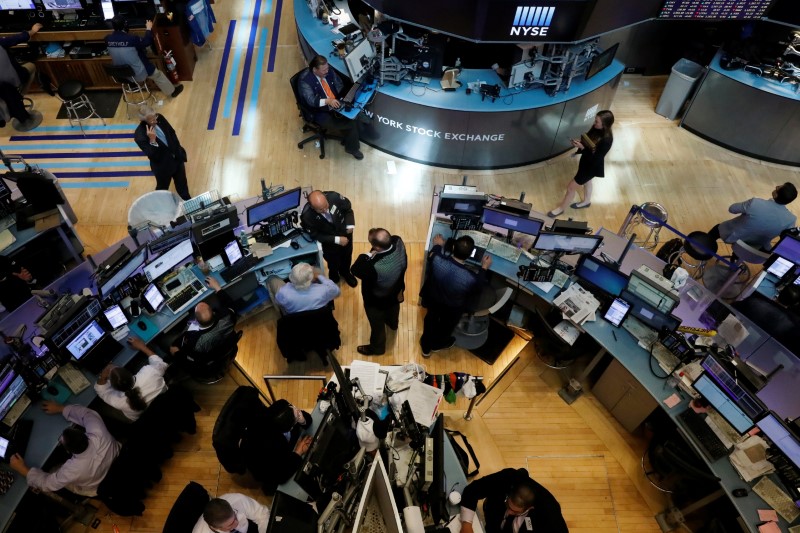By Geoffrey Smith
Investing.com -- Global markets reel from the sharp selloff in U.S. bank stocks on Thursday on concerns over what a medium-sized West Coast bank's problems could mean for the broader sector. The U.S. releases its monthly labor report, with employment growth expected to revert to trend after a distorted gain in February. Stocks are struggling to get past the gain line in the meantime, amid disappointment at updates from Gap, Oracle, and DocuSign. The U.K. economy continued to defy gravity in January, and oil prices skid on fears for the U.S. economy despite some jawboning by Saudi Arabia and Russia. Here's what you need to know in financial markets on Friday, March 10th.
1. Global markets follow U.S. lower after Silicon Valley news stokes fears
Global markets shuddered at the first signs of stress in the U.S. banking sector since the Federal Reserve started raising interest rates last year.
SVB Financial Group (NASDAQ:SIVB), also known as Silicon Valley Group, announced an emergency $2.25 billion capital raise to repair its balance sheet after taking $1.8B in losses on bonds that it had to sell to meet clients’ cash demands.
While the bank stressed that the measures will restore its capital levels, the message that its client community of startups is burning through cash at an increased level sparked fears that the technology sector could cause broader – if less severe – problems at other banks too.
The Dow Jones Banks index had fallen over 6% on Thursday in response to the news, while the S&P 500 Financials index fell over 4%. SVB, meanwhile, fell another 47% in premarket trading after losing 60% on Thursday.
2. Jobs growth set to return to normal
You can tell things are serious when the monthly U.S. jobs report gets knocked off the top slot on the day’s newsletters.
Developments in the labor market in February are going to be a crucial factor in the Federal Reserve’s decision at its policy meeting in two weeks’ time, and the numbers come only three days after Chair Jerome Powell warned that the central bank may have to step up the pace of rate hikes again to tame inflation, after trimming it at the last two meetings.
Analysts expect nonfarm employment to have risen by 205,000, which would be closer to the underlying trend than the outside 517,000 gain registered last month – much of which was due to seasonal adjustments and other statistical quirks. As always, developments in the labor force participation rate and in average hourly earnings will also have a big influence on how the figures are interpreted.
3. Stocks drifting lower; disappointment at Oracle, Gap
U.S. stocks are trending lower ahead of the jobs report as the SVB news continues to reverberate, but, frankly, no one who remembers 2007/8 is getting excited yet, given that SVB’s problems are, to a large degree, the result of its fairly idiosyncratic lending profile.
By 06:35 ET (11:35 GMT), tech-heavy Nasdaq 100 futures were even bouncing a little, gaining 0.2% after losing more than 2% on Thursday. Dow Jones futures, however, were down another 87 points, or 0.3%, owing to continued losses in bank stocks, while S&P 500 futures were down 0.1%.
JPMorgan (NYSE:JPM), Citigroup (NYSE:C), and Wells Fargo (NYSE:WFC) were all down by around 1%, while Bank of America (NYSE:BAC) stock was down 0.6%. Fifth Third Bancorp (NASDAQ:FITB), which has lost 20% this week on concerns of margin pressure from its corporate client base, eked out a 2.4% gain.
Banks aside, Gap (NYSE:GPS) stock was set to open at a new four-month low after yet another disappointing update, while DocuSign (NASDAQ:DOCU) slumped 13% after saying its CFO has had enough after less than two years at the company. Oracle (NYSE:ORCL) also fell 4% after its quarterly update – unfairly so, in the opinion of at least some analysts on the company’s conference call.
4. U.K. GDP stays out of the red, again
The U.K. economy continued to defy gravity in January, with preliminary estimates showing gross domestic product rose by 0.3%.
That means that the rolling quarterly growth rate again avoided slipping into negative territory, despite a sharp rise in interest rates and collapse in consumer confidence at the back end of 2022.
The numbers give the Bank of England a little more leeway to raise interest rates at its next meeting in two weeks’ time. Inflation has been running at around 10% for six months, higher than anywhere else in the G7. However, it appears to have peaked and Governor Andrew Bailey went out of his way earlier in the week to say that a rate hike isn’t certain at the meeting. His opinion was supported on Friday by worse-than-expected granular data for industrial production and construction output.
The pound rose 0.5% to its highest in three days in response.
5. Oil drifts lower, despite OPEC output fall
Crude oil prices fell to their lowest in two weeks as the SVB news filtered through to risk assets of all stripes.
By 06:45 ET, U.S. crude futures were down 0.9% at $75.08 a barrel, while Brent crude was down 0.7% at $81.00 a barrel. They were gaining little support from a Platts report suggesting that OPEC’s output fell some 80,000 barrels a day in February, not from commitments of continued cooperation in setting output levels from Russian Foreign Minister Sergey Lavrov after a meeting with his Saudi Arabian counterpart.
Russia has angered some members of the OPEC bloc by unilaterally cutting production to support relative prices for its own exports, which are being shunned by western buyers due to sanctions.
